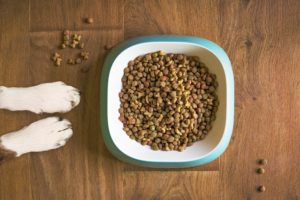This post contains affiliate links. See our Affiliate Disclosure Statement page for more details.
Table of Contents
Boxer Dog Diet – Introduction to Essential Nutrients
When it comes to ensuring the well-being of your beloved Boxer, a proper diet plays a crucial role.
Just like humans, Boxers require specific nutrients to maintain optimal health and vitality. In this blog post, we will explore the five essential nutrients that should be included in a Boxer’s diet.
Whether you are a new Boxer owner or simply looking to enhance your Boxer’s nutrition, understanding these key nutrients is essential. So, let’s dive in and discover the vital components of a healthy Boxer diet.
Boxer Dog Diet – 5 Essential Nutrients
A complete and balanced Boxer dog diet should consist of 5 essential nutrients to keep your Boxer healthy and active
The 5 essential Nutrients in a Boxer dog diet are:
- Proteins – 20-30%
- Fats
- Carbohydrates
- Vitamins
- Minerals
These essential nutrients can be further divided into 2 main subgroups: Macronutrients and Micronutrients.
Macronutrients – needed in larger quantities to provide energy
- Proteins
- Fats
- Carbohydrates
Micronutrients – vital in disease prevention and healthy development, taken in smaller quantities
- Vitamins
- Minerals
Boxer Dog Diet – Essential Macronutrient Recommended Requirements
Proteins
Boxers are a muscular breed that has a high energy and activity level. To stay active and healthy, Boxers require a diet higher in protein than less active dog breeds.
- Proteins are found in every cell in your body
- They play a key role in the development and repair of muscle tissue
Check Dog Food Pricing at Chewy
Most commercial dry dog foods contain between 23-27% protein for standard dry formulations, while the high protein dry dog foods typically contain proteins in the 25-45% range.
So how much protein do Boxer dogs need in their diet? According to the Merck Veterinary Manual, healthy adult dogs need a minimum of 2.6 grams of a high biologic-value protein for every kilogram of metabolic body weight.
Let’s break this down into what this means for your boxer dog’s total amount of protein required per day.
Assuming the average weight of a Male Boxer dog is 73 lbs, they would require 22.57 ounces of protein per day.
73lbs/2.2kg = 33.18kg x0.75 (to calculate Metabolic weight)= 24.88kg x 0.0026kg = 0.064kg = 22.57 oz
A female boxer dog with an average weight of 58 lbs would require 17.63 ounces of protein per day.
58/lbs/2.2kg = 26.31kgx0.75 = 19.6kg x 0.0026kg = 0.051kg = 17.63 ounces
Daily Protein Requirements | Puppies | Adult dogs |
American Association of Feed Control Officials (AAFCO) | 22.0 grams /day for growth | 18.0 adult maintenance minimum Dry state |
nap.nationalacademies.org | 56g/day | 25 g/day |
Merck Veterinary Manual | 45 g/day/1000 ME | 2.6 grams of protein/kg of metabolic body weight |
Dogfoodadvisor.com rated over 5750 dog food recipes and calculated the protein levels after removing the water content to be able to compare any two dog foods wet or dry to identify high-protein dog foods.
Based on their review, dog foods containing 28% or higher protein are considered high-protein dog foods.
Reference: Best High Protein Dog Food for 2022, dogfoodadvisor.com
According to feedingmydogbreed.com, a Boxer diet should consist of 30% protein.

Boxer dog diets should be based on selecting high-quality proteins as the number 1 ingredient (preferably the first 3 ingredients).
Fresh meat as the main ingredient in dry food formulations has demonstrated higher soluble protein content which can be attributed to higher digestibility. (Montegiove, et al., June 2022)
- Amino Acids are the building blocks of proteins
- Amino acids are essential in a Boxer dog diet
- The appropriate amounts of each amino acid are essential in keeping your Boxer healthy
The Merck Veterinary Manual indicates there are 10 Amino Acids that are essential in a dog’s diet.
In Table 1, we have compiled the 10 essential Amino Acids, their function, and the common foods they are found in.
Table 1 – 10 Essential Amino Acids for Dogs
Amino Acid | Function | Common Foods |
Arginine | Wound healing Stimulating immune function Promoting secretion of hormones: Insulin and growth hormone | Meats (red meat, chicken, turkey) |
Histidine | Required for the synthesis (making) proteins | Protein-rich foods Meats |
Isoleucine | Critical in growth, Immunity, protein metabolism, fatty acid metabolism and glucose transport | Meats |
Leucine | Protein synthesis | Salmon |
Lysine | Aids in calcium absorption and formation of collagen for strong bones, cartilage, tendons and skin | Meat - red meat, pork, poultry |
Methionine | Regulates metabolic processes Innate immune system Digestion | Tuna |
Phenylalanine | Needed for the synthesis of proteins Production of neurotransmitters: dopamine and norepinephrine | Chicken |
Threonine | Protein synthesis | Lean beef |
Tryptophan | Body uses it to make serotonin and melatonin involved in the sleep-wake cycle | Chicken |
Valine | Promotes muscle growth and tissue repair | Meat |
References:
Key points:
- Selecting dog food containing these protein sources will ensure your Boxer is getting the 10 essential amino acids to remain healthy.
- Owners feeding their pets a Raw Food Diet can select any of these proteins to include in their Boxer’s diet to incorporate these 10 essential amino acids.
- The lack of one or more of these essential amino acids can have detrimental effects on the dog’s growth and lead to the development of diseases. (Montegiove, et al. 2022)
- Studies have shown that a dog can tell if a single amino acid is missing and will not eat the dog’s food.
For additional information on Raw Food DIets, review our post on Raw Food Diet For Boxers – Definitive Cost Analysis – Are They A Good Value?
A potential issue for higher protein diets with Boxers is the breed is pre-disposed for both skin and food allergies. Proteins often are the offending allergen.
A Survey of Canine and Feline Skin Disorders seen in a University Practice: Small Animal Clinic, University Montreal, Saint-Hyacinth, Quebec, Scott, et al., found that Boxers were pre-disposed to atopic dermatitis and food hypersensitivity.
Read our posts
- 6 Foods That Lead To Allergies in Your Boxer,
- Best Dog Food for Boxers with Skin Allergies
- 7 Most Common Boxer Dog Allergies – Helping Your Boxer With Symptoms.
Boxer Dog Diet – Fats
We recommend Wild Earth Performance Formula Dog Food Veggie Chick’n Kabob Flavor
Fats are essential for both the storage of energy and the release of energy.
Dogs’ diets need to incorporate specific types of fats known as essential fatty acids EFA to help them remain healthy.
Fatty Acids can be Saturated (SFA), Monounsaturated (MUFA), or Polyunsaturated (PUFA)
The American Association of Feed Control Officials (AAFCO) recommends that adult dog food diets contain a minimum of 5% fat as dry matter.
A study by Supermarketnews.com found that “Dry Dog Food is used by 94% of US households as their main dog food for the past decade”.
In the study, The Hard Choice About Dry Pet: Comparison of Protein and Lipid Nutritional Qualities and Digestibility of Three Chicken-Based Formulations, Animals, Montegiove, et.al, Jun 2022, analyzed 3 formulations of Chicken based Kibble
- Chicken Fresh Meat (CFM) is the main protein source
- Chicken Meal Meats (CMM) – chicken meal is the primary protein source
- Chicken Fresh Meat and Chicken Meal Mix (CMIx) – as the primary protein source.
The initial percentages of fat in the dry kibble formulations before final processing is
- Chicken Fresh Meat – 88.3%
- Chicken Meal Meats – 16.1%
- Chicken Mix – 34.3%
As a final processing step in dry kibble formulations, the manufacturer coats the kibble with fats, mainly chicken or pork fat to make it more palatable to the dog.
After processing the study found the following fat percentages had to be added to each formula during the fat-coating process
- Chicken Meal Meats – 83.9%
- Chicken Mix – 65.3%
- Chicken Fresh Meat – 11.7%
The authors state that “Since raw materials consisting of fresh meat do not undergo the rendering process, which meat meals are usually subjected to and which also includes a degreasing phase, they are richer in fats, therefore they do not need to be added in excessive quantities during the final phases of production in order to make the kibble more palatable”.
Key points from the study:
- The Chicken Fresh Meat (CFM) formulation was demonstrated to be the most digestible with greater than 90% digestibility.
- Monounsaturated Fatty Acids (MUFA) and Polyunsaturated Fatty Acids (PUFA) were the highest in the Chicken Fresh meat formulations. They show beneficial health effects including
- Anti-inflammatory properties
- Improved skin and coat
- Provide energy
- The Chicken Fresh Meat formulations had lower levels of Saturated Fatty Acids (SFAs). This is important because SFAs can lead to negative health consequences including insulin resistance and inflammation.
The National Research Council is the organization that sets guidelines for both Macronutrients (which include Proteins, Carbohydrates, and Fats) and micronutrients (vitamins & minerals) to be incorporated into a dog’s diet.
NRC’s recommendation for a dog’s diet is 1.3 grams of fat/metabolic body weight/day.
Assuming the average weight of a Male Boxer dog is 73 lbs, they would require 1.14 ounces of fat per day
73lbs/2.2kg = 33.18kg x0.75 (to calculate Metabolic weight)= 24.88kg x1.3 g = 32.34g = 1.14 ounces
A female boxer dog with an average weight of 58 lbs would require 1 ounce of protein per day.
58/lbs/2.2kg = 26.31kgx0.75 = 19.6kg x 1.3g = 0.051kg = 0.89 ounces
Canines require 2 specific types of essential fatty acids
- Linoleic Acid – essential fatty acids commonly found in corn and soybean oil.
- a-Linoleic Acid (Alpha) – Studies have demonstrated that this essential fatty acid is essential in a dog’s diet. This is an Omega-3 fatty acid found in Flaxseed oil.
Summary of fats
- Select dry kibble formulations that use fresh meat as their primary ingredient. These have the best soluble fat content, digestibility, and most MUFA and PUFAs.
- Select kibble that contains linoleic acid and a-linoleic acid.
Boxer Dog Diet – Carbohydrates

Carbohydrates are an essential part of a Boxer dog’s diet. They provide energy for your dog’s daily activities, such as running, playing, and working. Carbohydrates are also important for maintaining a healthy weight and promoting a healthy gut microbiome.
Types of carbohydrates
The main types of carbohydrates found in dog food are:
- Sugars: Sugars are simple carbohydrates that are quickly digested and absorbed by the body. Examples of sugars include glucose, fructose, and sucrose.
- Starches: Starches are complex carbohydrates that are broken down into glucose more slowly than sugars. Examples of starches include rice, potatoes, and wheat.
- Non-starch polysaccharides: Non-starch polysaccharides are complex carbohydrates that cannot be digested by dogs. However, they play an important role in gut health by providing food for probiotics. Examples of non-starch polysaccharides include fiber and cellulose.
Examples of carbohydrates in a Boxer dog’s diet
Some common examples of carbohydrates found in commercial dog foods include:
- Whole grains: Oats, brown rice, and barley are all good sources of complex carbohydrates and fiber.
- Fruits and vegetables: Fruits and vegetables are good sources of vitamins, minerals, and antioxidants. They also contain some carbohydrates but in smaller amounts than grains.
- Starchy vegetables: Starchy vegetables, such as potatoes, corn, and peas, are good sources of complex carbohydrates. However, they should be fed in moderation, as they can be high in calories.
We recommend Ollie Fresh Chicken With Carrots and Fresh Turkey With Blueberries
How much carbohydrates do Boxer dogs need?
The amount of carbohydrates that a Boxer dog needs depends on several factors, including age, activity level, and overall health. However, most Boxer dogs need between 25% and 35% of their diet to come from carbohydrates.
Choosing a Boxer dog food with the right amount of carbohydrates
When choosing a Boxer dog food, it is important to select one that has the right amount of carbohydrates. Too many carbohydrates can lead to weight gain and other health problems, such as diabetes. Too few carbohydrates can lead to low energy levels and other health problems.
It is also important to choose a Boxer dog food that contains high-quality carbohydrates. Avoid foods that contain artificial sugars and fillers. Instead, look for foods that contain whole grains, fruits, and vegetables.
Carbohydrates are an essential part of a Boxer dog’s diet. They provide energy, help to maintain a healthy weight, and promote a healthy gut microbiome. When choosing a Boxer dog food, it is important to select one that has the right amount of high-quality carbohydrates.
Check Dry Food Pricing at Cherrybrook
Fiber can play a key role in your dog’s GI health. Fiber includes the edible part of plants that cannot be absorbed like other foods in the small intestine.
It can be partially or totally absorbed in the large intestine based on the type of fiber being consumed
Type of Fiber | Source | Solubility |
Insoluble | Beet Pulp Cellulose Rice Bran | Low |
Soluble | Gum Arabic Methylcellulose Inulin | High |
Soluble & Insoluble | Psyllium | High Low |
Fermentable Fibers containing Lactose can function as pre-biotics in dogs. Pre-biotics are precursors to probiotics.
Both play a role in stimulating the growth of “Good” bacteria in the intestines. The two major ones include
- Bifidobacterium
- Lactobacillus
Refer to our post on Natural Probiotic Food For Dogs – Choosing the Right Probiotic Foods For Boxer Dogs for more information on pre and probiotics.
Boxer Dog Diet – Vitamins
Dog Food manufacturers fortify their products with vitamins that typically exceed the minimum requirements set for dog foods.
Certain vitamins do not have AAFCO guidelines because the dog can either synthesize it themselves or bacteria in the GI tract synthesize them. These include:
Vitamin C – dogs can synthesize this vitamin in their liver
Vitamin K – intestinal bacteria in the dog’s GI Tract synthesize it for them.
If you are feeding your Boxer dog a raw diet or a homemade diet make sure that foods are added that provide adequate vitamins to your pet’s diet.
Boxer Dog Diet – Minerals
Minerals can be divided into
- Macrominerals – These include Sodium, Potassium, Calcium, Phosphorus, and Magnesium.
- Required for normal body functioning and to keep your dog healthy
- Required in gram amounts/day
- Trace Minerals – These include Iron, Zinc, Copper, Iodine, Fluoride, Selenium, and Chromium
- Required in micrograms/day (mcg/day)
Commercially purchased dog foods will have these included on the product label. Raw Food Diets and Homemade diets can use a variety of food sources in the diets to provide these essential minerals.
We recommend Nom Nom’s Probiotic Support – Full Spectrum For Dogs
Specific Recommendations for Boxer Dogs on the 5 Essential Nutrients
Protein
Boxer dogs are a muscular breed with a high energy level, so they need a diet that is high in protein. Aim to choose a dog food that contains at least 28% protein.
Fat
Fat is an important source of energy for Boxer dogs, and it also helps to keep their skin and coat healthy. Choose a dog food that contains at least 5% fat, and look for one that contains omega-3 fatty acids.
Carbohydrates
Boxer dogs need carbohydrates for energy, but it is important to choose complex carbohydrates over simple carbohydrates. Avoid dog foods that contain artificial sugars and fillers. Instead, look for foods that contain whole grains, fruits, and vegetables.
Vitamins and minerals
Boxer dogs need all of the same vitamins and minerals as other dogs. However, they are prone to certain health problems, such as allergies and skin conditions. It is important to choose a dog food that is fortified with the vitamins and minerals that Boxer dogs need, such as vitamin A, vitamin E, and zinc.
Specific recommendations for Boxer dogs with allergies and skin conditions:
- Choose a dog food that is hypoallergenic and free from common allergens, such as chicken, beef, and dairy.
- Look for dog food that contains omega-3 fatty acids, which can help to reduce inflammation and improve skin health.
- Avoid dog foods that contain artificial colors, flavors, and preservatives.
If your Boxer dog has allergies or skin conditions, it is important to talk to your veterinarian about the best diet for them.
Here are some additional tips for choosing a healthy dog food for your Boxer:
- Look for a dog food that is specifically formulated for Boxer dogs or for large breeds.
- Avoid dog foods that contain artificial ingredients, fillers, and by-products.
- Choose a dog food that is made in the United States and that is regulated by the FDA.
- Feed your Boxer a high-quality dog food that meets their individual needs.
By following these recommendations, you can help to ensure that your Boxer dog is getting the nutrients they need to stay healthy and happy.
Boxer Dog Diet Conclusion
The five essential nutrients in a Boxer dog’s diet are protein, fat, carbohydrates, vitamins, and minerals. Each of these nutrients plays a vital role in your dog’s health and well-being.
- Protein is essential for building and repairing muscle tissue, as well as producing hormones and enzymes.
- Fat provides energy, helps to keep the skin and coat healthy, and supports brain development.
- Carbohydrates provide energy for daily activities, such as running, playing, and working.
- Vitamins are essential for a variety of bodily functions, such as metabolism, immunity, and vision.
- Minerals are essential for strong bones and teeth, as well as fluid and electrolyte balance.
Boxer dogs are prone to certain health problems, such as allergies and skin conditions. It is important to choose a dog food that is high in protein and omega-3 fatty acids, and free from common allergens.
By feeding your Boxer a diet that is rich in all five essential nutrients, you can help to ensure that they stay healthy and happy for many years to come.
Remember, the best diet for your Boxer dog is one that is tailored to their individual needs. Talk to your veterinarian about the best way to feed your Boxer dog for their optimal health.

Discoverboxerdogs.com are Mary and Chris Kustanbauter. We reside in Red Lion, PA with our two Boxers, Duke and Katie, who are both rescue dogs. We have been working with Adopt A Boxer Rescue for the past 17 years and have adopted 5 Boxers from this fine organization. To learn more visit our Home, Boxer Dog Family, and Blogs Pages Visit us on social media on Facebook – All About Boxers, Instagram, and Pinterest.


